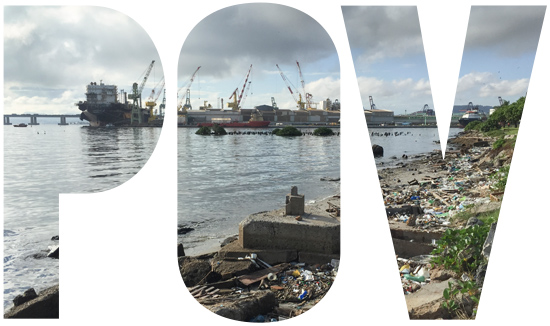POV: Swimming in Sh*t
Olympic aquatic athletes at risk from untreated sewage

Lots of garbage and visible pollution in Guanabara bay, Rio de Janeiro, Brazil. Photo by pabst_ell/iStock
Over the next two weeks, more than 10,000 athletes will compete in the Summer Olympics in Rio de Janeiro. While the Zika epidemic has been the chief health concern for athletes, attendees, and many public health experts, another health alarm is sounding for the 1,400 participants who will be competing in the aquatic events. These world-class athletes will be swimming in sh*t—literally. According to a 2015 Associated Press report, they will be exposed to water “so contaminated with human feces that they risk becoming violently ill and unable to compete in the games.” The AP report was based on a well-conducted water sampling study that found alarmingly high levels of disease-causing bacteria and viruses at many event locations, including the famed Copacabana Beach, where the competitors will enter the water for marathon and triathlon swimming events and where thousands of tourists are expected to swim. The report also suggests that there is a 99 percent infection risk for athletes who ingest as little as a tablespoon of polluted water. And if that’s not enough, the aquatic venues will likely be strewn with floating trash—objects as small as a toy teddy bear, as large as a mattress, and as disgusting as a dead animal.
How did this happen in a city of incredible mountaintop statues, brilliantly costumed Carnival dancers, and tall supermodels? The answer is a poorly functioning sanitation system, the consequence of a troubled economy and rapid population growth. Rio does have a sewage treatment system designed to “clean” its waste before it is discharged into the environment, but about one-third of homes are not connected to the sewer pipes. So a high volume of untreated sewage continually flows through open-air ditches into Rio de Janiero’s rivers and main harbor. And when it rains, the ditches often overflow, resulting in sewage-tinged water that runs down residential streets and contaminates nearby drinking water supplies.
Unfortunately, inadequate sanitation is not limited to Rio de Janeiro. Throughout the world, raw or minimally treated sewage is routinely discharged into rivers, lakes, and oceans. Even Boston’s wastewater management system has a large outfall pipe that discharges effluent into Massachusetts Bay. However, Boston’s sewage discharge is relatively clean thanks to the Massachusetts Water Resources Authority’s Deer Island Treatment Plant, where waste undergoes a multistep process that includes disinfection, greatly reducing disease-causing microorganisms in the effluent.
The Olympic athletes, and more important, the residents of Rio de Janeiro, aren’t so fortunate. Even if Rio’s government is able to implement a few last-minute stopgap measures to remove the obvious trash and lower the most egregious contaminant levels, health risks to athletes remain serious. Measures such as rinsing with antibacterial mouthwash, taking preventive antibiotics, and getting vaccinated for hepatitis A will undoubtedly help, but it’s likely that some athletes will become ill (and perform poorly) because of the pollution. However, the risks to the athletes, while serious, are transient compared to the daily risks of residents. Even though it’s been nearly 170 years since John Snow demonstrated that cholera was spread through fecal contamination of drinking water, the lessons learned from Snow’s elegantly designed epidemiological research and his sensible recommendations are still relevant today, since insufficient sanitation accounts for an estimated 1.5 million deaths annually from infectious and parasitic diseases.
So while we have the attention of the press and the public during the Olympics, let’s give voice to the importance of adequate sanitation and clean water for all people, all of the time. As the 2010 United Nations resolution states, “The right to safe and clean drinking water and sanitation [is] a human right that is essential for the full enjoyment of life.” The 2.4 billion people who still live without sanitation will need our help to achieve this right long after the Summer Olympic medals have been awarded.
I am grateful to David Ozonoff, a School of Public Health professor of environmental health, for his insightful comments on this article.
Ann Aschengrau, a School of Public Health professor of epidemiology, can be reached at aaschen@bu.edu.
A version of this POV originally ran on the School of Public Health website.
“POV” is an opinion page that provides timely commentaries from students, faculty, and staff on a variety of issues: on-campus, local, state, national, or international. Anyone interested in submitting a piece, which should be about 700 words long, should contact Rich Barlow at barlowr@bu.edu. BU Today reserves the right to reject or edit submissions. The views expressed are solely those of the author and are not intended to represent the views of Boston University.
Comments & Discussion
Boston University moderates comments to facilitate an informed, substantive, civil conversation. Abusive, profane, self-promotional, misleading, incoherent or off-topic comments will be rejected. Moderators are staffed during regular business hours (EST) and can only accept comments written in English. Statistics or facts must include a citation or a link to the citation.